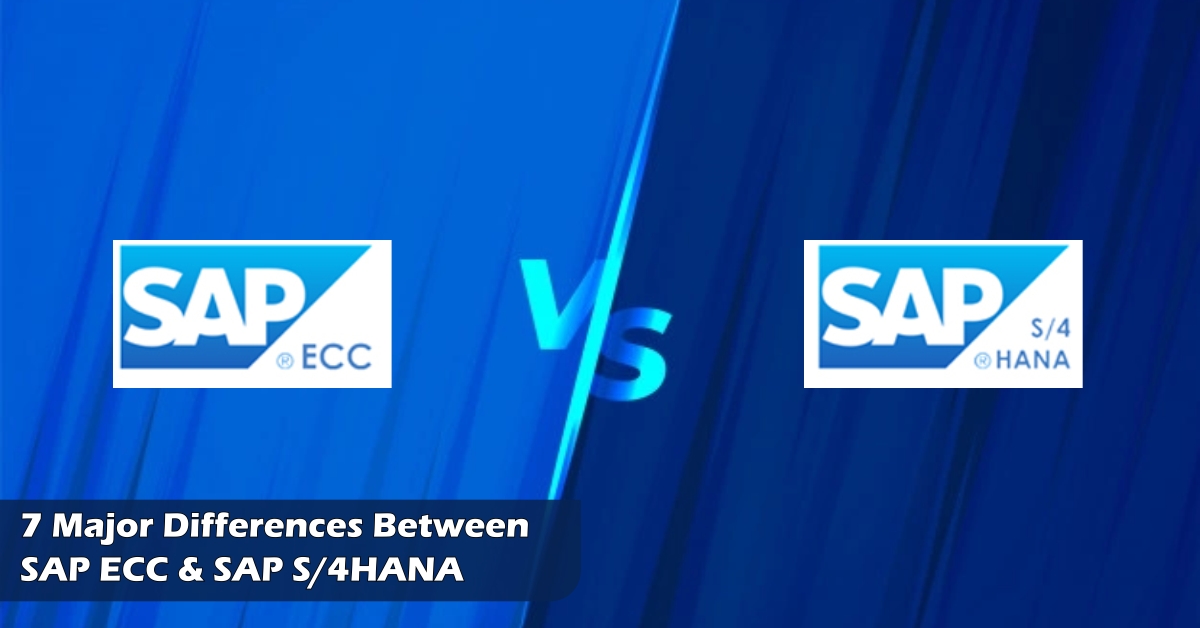7 Major Differences Between SAP ECC And SAP S/4HANA

Many businesses and IT leaders find themselves in a state of disrepair as 2027 – and thus, the end of SAP support for SAP ERP Central Component (ECC) asset storage software. Many wonders: What will it take to move to SAP S / 4HANA? When is the best time to do that? How should we do it better?
The process begins with the adoption of SAP’s smart business framework – an all-encompassing change in the organization’s processes towards a digitally transformed future. This requires a combination of modern technology and integrated business processes that are defined, robust and sustainable. It needs to bring performance and experience data together. It also requires proving customer knowledge and work experience in all tests. It means bringing statistics forward in the decision-making process.
However, in order to successfully integrate this digital-enabled future, companies need to plan ahead today by expanding their capabilities, embracing technology that works unparalleled, and taking advantage of the opportunity offered by SAP FICO Online Training. What should they do to make that happen? Here’s a closer look at the differences between SAP ECC and S / 4HANA. Such comparisons can help to identify the way forward and highlight the opportunities available.
Similarities
Two SAP ERP programs share the same number of items.
Both ECC and S / 4HANA enable business operations for sales, procurement, production, distribution, service, quality, accounting services, and crop maintenance. Both of these programs provide integration of company operations into a single website; configuration and automation of standard operations and a single source of performance reporting. ECC and S / 4HANA are both modular systems, designed in such a way that businesses can use the pieces they need, logically tailored to their business needs.
In all, SAP S / 4HANA and SAP ECC share about 90% of their key features and functions. However, with technology shifts, there will have to be differences and benefits that companies can reap within themselves.
The difference
Significant differences between SAP ECC and SAP S / 4HANA. Let’s dive a little deeper by looking at the five major differences below.
Website. SAP ECC can work on third-party databases such as Oracle, MaxDB, and IBM. SAP S / 4HANA can only be used with SAP FICO Training in Delhi, the most memorable modern technology.
Customer compared to retailer in Business Partner. SAP ECC maintains separate files for customers and vendors, even in those cases where the organization is collaborating with the company in both operations. S/4HANA integrates the elements of a standard data structure into a business partner record.
Integration Management (CO) and Finance (FI). In SAP ECC, FI GL accounts are included in the map of CO’s main cost items. In S/4HANA, the universal journal format is used to maintain both the GL account and the total cost.
New General Ledger (GL). SAP ECC can work with the “old” GL structure or the “new” GL structure. The S / 4HANA only uses the new GL, technically very similar to that of the new GL in the ECC. However, the performance of the new GL is required in S / 4HANA and is a requirement for the calculation of net assets.
Discounts. Customer discounts on the existing SD discount process at ECC have been replaced by compensation management through conditional contracts at S / 4HANA.
To be sure, there are deltas on both sides of the Venn diagram when it comes to S / 4HANA and ECC. However, as a leading chess players, successful leaders must look forward to making sure they stay on the right track on the road map for their business.
SAP ECC can help a business run today. But to get where the business needs to go tomorrow, the infrastructure provided by SAP S / 4HANA provides a foothold in the SAP business door. The actual power to move to S / 4HANA is no different from ERP today; it’s in business diversity tomorrow.

